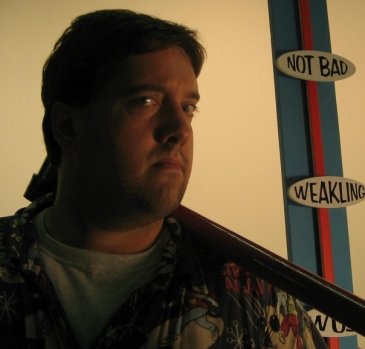 James Herbert has been a solid name in the horror genre ever since the widespread success of his first novel, The Rats, back in 1974. Seven books and eight years later, The Rats was turned into both the film Deadly Eyes (directed by Robert Clouse, the man who gave us Gymkata) featuring dogs dressed up like rats almost as convincingly as the titular carpet-covered canines in The Killer Shrews, and a Commodore 64 video game.
James Herbert has been a solid name in the horror genre ever since the widespread success of his first novel, The Rats, back in 1974. Seven books and eight years later, The Rats was turned into both the film Deadly Eyes (directed by Robert Clouse, the man who gave us Gymkata) featuring dogs dressed up like rats almost as convincingly as the titular carpet-covered canines in The Killer Shrews, and a Commodore 64 video game.
It is a pleasant surprise that the puppet masters behind the World Horror Convention, being held this year in Brighton, have selected James Herbert as the Guest of Honor. Never one to be influenced by his own success, many of Herbert’s books strayed from the boundaries  expected by horror publishers and readers alike. His fourth book, Fluke (1977), for example, was a decidedly non-horrific tale of a dead man who attempts to reunite with his family after being reincarnated as a dog. Fluke’s concept was unceremoniously ripped off by Rod Browning in his screenplay debut, Oh Heavenly Dog! (starring Benji and Chevy Chase), and then faithfully adapted to the big screen fifteen years later.
expected by horror publishers and readers alike. His fourth book, Fluke (1977), for example, was a decidedly non-horrific tale of a dead man who attempts to reunite with his family after being reincarnated as a dog. Fluke’s concept was unceremoniously ripped off by Rod Browning in his screenplay debut, Oh Heavenly Dog! (starring Benji and Chevy Chase), and then faithfully adapted to the big screen fifteen years later.
Two other James Herbert novels were lucky enough (if lucky is the word) to make it to the big screen. The Survivor, his third book and first foray into the supernatural, became the first Australian film with a budget exceeding $1 million, and the last film to star Joseph Cotton. Then, in the mid-eighties, Herbert turned an unused BBC screenplay into the novel Haunted, which was then adapted into a screenplay for the mid-nineties film by the same name.
Since the fluke that was Fluke, James Herbert has never been afraid to mix it up a bit. Dancing back and forth between apocalyptic horror stories and almost storybook tales of the supernatural, James Herbert has always dared to go wherever the muse takes him, no matter what the accepted definitions of his chosen genre might be.
Some hardcore horror fans will complain that Herbert had forsaken horror for fantasy early in his career by not delivering the minimum amounts of sex and violence demanded by the  blood thirsty horror genre devotees. But what the WHC has recognized is that deviating from the norm is what keeps things fresh and inventive.
blood thirsty horror genre devotees. But what the WHC has recognized is that deviating from the norm is what keeps things fresh and inventive.
There are so many horror authors out there who are happy enough to simply crank out novel after novel of the same format, until one is barely distinguishable from the others. I’m not going to name names. Okay, maybe I’ll mention Bentley Little. The point is real artists define the genre they work in, not the other way around, and James Herbert has more than made his own way. Hell, any horror author willing to turn a human-possessed squirrel into a reoccurring character in later novels is a force to be reckoned with.
 Jendi Reiter, final judge of the Wergle Flomp contest, said the winning entry stood out because it, “didn’t stop with the initial joke premise, but creatively expanded on it, at just the right length. The humor builds as the speaker’s language becomes more florid and sensuous, moving from embarrassment to excitement as he imagines different scenarios for making use of these phallus-shaped illumination devices.”
Jendi Reiter, final judge of the Wergle Flomp contest, said the winning entry stood out because it, “didn’t stop with the initial joke premise, but creatively expanded on it, at just the right length. The humor builds as the speaker’s language becomes more florid and sensuous, moving from embarrassment to excitement as he imagines different scenarios for making use of these phallus-shaped illumination devices.”

![Reblog this post [with Zemanta]](https://i0.wp.com/img.zemanta.com/reblog_e.png)


 a supernatural bogeyman. Many authors would present the tale on its own with perhaps a few embellishments for dramatic effect. Schneck, however, tells the story (which is genuinely creepy and unsettling) and then proceeds to examine the possible explanations for the events that took place, including research into possible real-world connections. His historical and scholarly comparisons and explanations are as captivating as the story itself, and do nothing to prevent readers who have used a
a supernatural bogeyman. Many authors would present the tale on its own with perhaps a few embellishments for dramatic effect. Schneck, however, tells the story (which is genuinely creepy and unsettling) and then proceeds to examine the possible explanations for the events that took place, including research into possible real-world connections. His historical and scholarly comparisons and explanations are as captivating as the story itself, and do nothing to prevent readers who have used a ![Reblog this post [with Zemanta]](https://i0.wp.com/img.zemanta.com/reblog_c.png)





